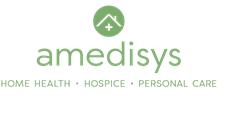Exhibit 99.1
| | |
 | | Contact: Kendra Kimmons Vice President of Marketing & Communications 225-299-3708 kendra.kimmons@amedisys.com |
Amedisys Signs Definitive Agreement to Acquire Bring Care Home
BATON ROUGE, La., July 31, 2018 – Amedisys, Inc. (NASDAQ:AMED), one of the nation’s leading home healthcare, hospice and personal care companies, announced today that its subsidiary, Associated Home Care, has signed a definitive agreement to acquire Bring Care Home, a personal care provider in northeastern Massachusetts.
Under the terms of the agreement, Associated Home Care will acquire substantially all assets of Bring Care Home.
Bring Care Home is a privately owned company providing personalized,one-on-one quality care to clients in the North Shore, Merrimack Valley and Greater Boston areas. The company provides personal care,live-in home care, companionship, transportation and skilled nursing to clients.
“Expanding our footprint in Massachusetts, a state in which we provide our three service lines of home health, hospice and personal care, is an important component of our growth strategy,” stated Amedisys President and CEO Paul Kusserow. “I look forward to welcoming these home care professionals into the Amedisys family of caregivers.”
The Amedisys Personal Care Division provides individualized, compassionate care to clients in Massachusetts and the areas surrounding Knoxville, Tennessee and Jacksonville, Florida.
Forward-Looking Statements:
When included in this press release, words like “believes,” “belief,” “expects,” “plans,” “anticipates,” “intends,” “projects,” “estimates,” “may,” “might,” “would,” “should” and similar expressions are intended to identify forward-looking statements as defined by the Private Securities Litigation Reform Act of 1995. These forward-looking statements involve a variety of risks and uncertainties that could cause actual results to differ materially from those described therein. These risks and uncertainties include, but are not limited to the following: changes in Medicare and other medical payment levels, our ability to open care centers, acquire additional care centers and integrate and operate these care centers effectively, changes in or our failure to comply with existing Federal and State laws or regulations or the inability to comply with new government regulations on a timely basis, competition in the healthcare industry, our ability to integrate our personal care segment into our business efficiently, changes in the case mix of patients and payment methodologies, changes in estimates and judgments associated with critical accounting policies, our ability to maintain or establish new patient referral sources, our ability to attract and retain qualified personnel, changes in payments and covered services due to the economic downturn and deficit spending by federal and state governments, future cost containment initiatives undertaken by third-party payors, our access to financing, our ability to meet debt service requirements and comply with covenants in debt agreements, business disruptions due to natural disasters or acts of terrorism, our ability to integrate,
